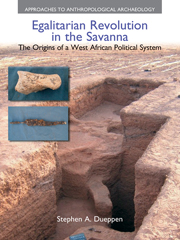Book contents
- Frontmatter
- Dedication
- Contents
- List of Figures
- List of Tables
- Acknowledgments
- 1 Decentralization and the Evolution of Egalitarian Behaviors in Sedentary Societies
- 2 Ancient Villages in the Niger Bend: Context and Methods for Exploring the Voltaic Region
- 3 Ethnographic Perspectives on Western Burkina Faso: A Survey
- 4 Kirikongo: An Introduction to the Site, the Setting, and the Research Design
- 5 The West African Environmental Setting: Kirikongo in Ecological Context
- 6 Stratigraphies and Depositional Episodes: The Excavations
- 7 Relative Chronology: Ceramics
- 8 Community Growth at Kirikongo: The Spatial and Temporal Setting
- 9 Early Sedentary Life in the Voltaic Region: Defining a ‘Voltaic Tradition’
- 10 Craft Production at Kirikongo: The Origins, Development and Reinterpretation of Specialization
- 11 Herding, Farming, and Ritual Sacrifice: The Economy from Kirikongo
- 12 Death and Ritual Objects at Kirikongo: House-Based Social Differentiation
- 13 Archaeological Patterns and Social Process: Reconstructing Changing Life at Kirikongo
- 14 Land, Spiritual Power, and Gerontocracy: An Exploration of the Roots of Egalitarian Revolution in the Western Voltaic Region
- 15 Hierarchy and Egalitarianism within the Niger Bend: Revolution and the Triumph of Communalism
- Bibliography
- Index
3 - Ethnographic Perspectives on Western Burkina Faso: A Survey
- Frontmatter
- Dedication
- Contents
- List of Figures
- List of Tables
- Acknowledgments
- 1 Decentralization and the Evolution of Egalitarian Behaviors in Sedentary Societies
- 2 Ancient Villages in the Niger Bend: Context and Methods for Exploring the Voltaic Region
- 3 Ethnographic Perspectives on Western Burkina Faso: A Survey
- 4 Kirikongo: An Introduction to the Site, the Setting, and the Research Design
- 5 The West African Environmental Setting: Kirikongo in Ecological Context
- 6 Stratigraphies and Depositional Episodes: The Excavations
- 7 Relative Chronology: Ceramics
- 8 Community Growth at Kirikongo: The Spatial and Temporal Setting
- 9 Early Sedentary Life in the Voltaic Region: Defining a ‘Voltaic Tradition’
- 10 Craft Production at Kirikongo: The Origins, Development and Reinterpretation of Specialization
- 11 Herding, Farming, and Ritual Sacrifice: The Economy from Kirikongo
- 12 Death and Ritual Objects at Kirikongo: House-Based Social Differentiation
- 13 Archaeological Patterns and Social Process: Reconstructing Changing Life at Kirikongo
- 14 Land, Spiritual Power, and Gerontocracy: An Exploration of the Roots of Egalitarian Revolution in the Western Voltaic Region
- 15 Hierarchy and Egalitarianism within the Niger Bend: Revolution and the Triumph of Communalism
- Bibliography
- Index
Summary
Set between two areas with long histories of state-craft, the non-centralized societies of western Burkina Faso from the start of the colonial era were considered as peripheral, with little to contribute to neighboring important ‘civilizations’ (see Chapter 2). However, the organizational principles and cultural practices that underline fundamental societal differences are remarkably diverse and complex, and communities and multi-family houses can encapsulate social and cosmological principles ranging from communalism to hierarchy, manifesting in both independence and interdependence depending upon the specific activity or circumstance. In this chapter I compare features of four different societies in order to provide a foundation derived from Voltaic logic for reconstructing the material patterns from the archaeological site of Kirikongo. The generalized models of the societies presented below are for analytical purposes, and it is acknowledged that regional ethnicity can be very fluid, such that within a particular ethnic group deviations from normative practice are to be expected. For example, some southern Bwa communities, owing to proximity to Dagari societies, keep cattle, while the practice is rare elsewhere.
The political systems of Burkina Faso have been classified in ethnographic analyses into several categories, including: segmentary societies with centralized power (the Mossi), ‘village societies’ without centralized power (the Bwa), and segmentary societies without centralized power (the Lobi). These divisions are rooted in Fortes and Evans-Pritchard's state/stateless dichotomy (1940), but include the concept of ‘village societies’ introduced by Gallais (1960) and Capron (1973). Within this framework segmentary and village societies are considered two ends of a continuum regarding organizational principles. On one end, village societies are those in which multi-family houses are deeply devoted politically, socially, and religiously to a village community, transcending kin-based politics.
- Type
- Chapter
- Information
- Egalitarian Revolution in the SavannaThe Origins of a West African Political System, pp. 27 - 54Publisher: Acumen PublishingPrint publication year: 2012



